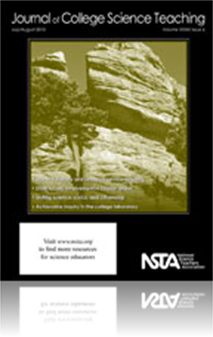All Journal of College Science Teaching resources
Journal Article
This case is based on the real-life incident of a boy whose arm was bitten off by a bull shark while he was swimming off the Florida coast in the summer of 2001. After the boy’s arm was retrieved from the shark’s mouth, it was then surgically rea...
Journal Article
A motion picture company (c. 1950) is having problems with antiquated equipment. The director, actors, and crew all want the CEO of the company, who is notorious for being tight with money, to invest in a newly developed zoom lens. Students are asked...
Journal Article
This interrupted case study presents published data on the effect of coyote removal in Texas to teach students about trophic level relationships and the role of keystone species. Students are required to interpret data that are presented graphically ...
Journal Article
In this directed case study on the structure of the cell and functions of the major organelles, students examine one of the most important events of evolution: the origin of the eukaryotic cell. Students research the two major hypotheses involved and...
Journal Article
This article describes the structure and content of a one-semester course dealing with chemistry, science, and technology designed for nonscience majors. The course uses a hybrid of two active learning methodologies—problem-based team learning and ...
Journal Article
Refocusing Natural Resource Management
Achieving scientific literacy requires students to understand how science is applied in the real world. A capstone class at Virginia Tech focuses on the role science and scientists play in the process of natural resource management. As a result, stud...
Journal Article
The Case Study: Twixt Fact and Fiction
What shall it be, a real case connected to the real world with blood, sweat, and tears or a fantasy, a twice-told tale by a spinner of yarns around a campfire on a summer night? When a teacher sits down to write a case, he is lured by the former and ...
Journal Article
Favorite Demonstration: Demonstrating a Thermodynamics Fountain
Cryogenic materials, mainly liquefied and solidified gases, are probably the most fascinating materials to use for demonstrating chemical reactions to introductory college students. A popular series of articles (Blachley 1997; Coppola et al. 1994; Ha...
Journal Article
Teaching Demands verses Research Productivity
Faculty in undergraduate institutions are scholars and need to be actively engaged in research. They must also publish and get grants to be promoted and tenured. The strong demand on their time for teaching and college services, however, leaves them ...





